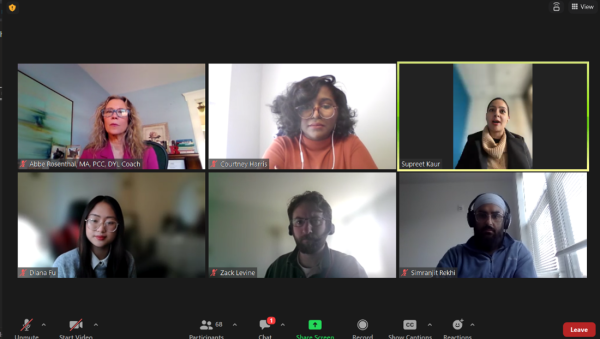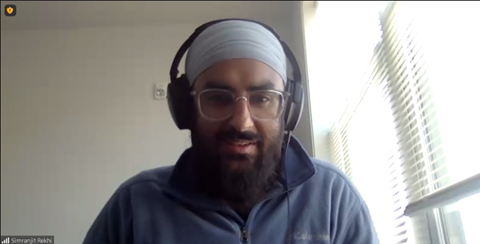MBS has a vast, varied, and engaged alumni community. Our alumni are always willing to help current students through mentoring, serving as panelists, and sharing industry-specific knowledge. On Friday, November 18th, five MBS alumni shared their wisdom during a virtual lunch hour. The panel was hosted by MBS executive coach Abbe Rosenthal, MA, PCC.

Meet the Panelists
Courtney Harris – Personal Care Science, MBS’21. Harris received an undergraduate degree in biochemistry and molecular biology. She considered pursuing a degree in library and information science before discovering the MBS program. She currently works for Colgate-Palmolive in personal care implementation and support. You can read more about Harris in her Alumni Highlight.
Why MBS? Harris found personal care science to be a perfect fit, combining her passions for science, storytelling, and marketing. Her goal was to leave the program with amazing connections and to take advantage of all the opportunities MBS offered.
Simranjit Rekhi - Engineering Management, MBS’20. Rekhi received an undergraduate degree in biomedical engineering. After graduation, he became interested in the business side of bringing solutions to market. During his time in the MBS program, he developed his business skills and tailored his resume. He currently works as a project manager at Citi Bank.
Why MBS? Rekhi realized that the next step in his career would be to bridge the gap between business and technology. MBS allowed him to use his technical background while learning essential business skills.
Zack Levine – Cybersecurity. Levine started his career working in the oil spill response and compliance industry, where he discovered his passion for IT. He currently works as a security engineer and penetration tester.
Why MBS? MBS allowed Levine to leverage his policy and product management background while gaining technical skills for a new career in the tech industry.
Diana Fu - User Experience and Design, MBS’22. Fu received her undergraduate degree in business from Rutgers University, discovering a passion for marketing and digital marketing. She currently works as Associate UX Designer at KPMG US.
Why MBS? Fu wanted to understand a broad spectrum of how business structures work. MBS allowed her to leverage her business background as she transitioned to UXD, enjoying how it is both technical and creative. She felt comfortable in this degree because many students came from different academic backgrounds, and they were all helping each other succeed.
Supreet Kaur – Data Analytics, MBS’19. Kaur received an undergraduate degree in mathematics. She currently works for Morgan Stanley. Find out more about her MBS journey on our Alumni Career Stories page.
Why MBS? Knowing that she wanted to pursue higher education, Kaur chose MBS because it would provide her with the business skills that she would need to succeed in her career.
Questions from Current Students
Q: The MBS program requires constant presentation. How do you overcome resistance toward presenting?
“It comes with practice,” said Rekhi. He shared the advice he received as a student: to practice your presentation in front of a mirror. He also advised students not to pressure themselves to be perfect—what matters most is getting the message across. Rekhi uses these presentation skills in his current role where he presents to senior leaders, managers, and other executives.
Fu highlighted the importance of preparing for a presentation. She advised students to do their research, write a script if needed, and anticipate questions. “Be mindful of reading the room,” she said. She recommended that students understand the audience and how they feel.
“It is a skillset to be focused, to have your talking points, and to know your audience,” said Harris. Understanding the variances and nuances of the audience is crucial, she said. Harris stressed the importance of presenting science in a palatable, engaging way. She still uses tips she learned from Kathleen Cashman, such as telling herself that she is excited instead of nervous before an interview. “Just be yourself, and remember—at the end of the day, you know what you’re talking about.”
“Growth lies out of your comfort zone,” said Kaur. Kaur shared her own story. “When I first came to the US, I was so nervous because English is not even my first language. And now I’m an international speaker. And it is just because of practice.” She suggested improving these skills through resources such as LinkedIn learning or a Public Speaking course.
Levine, who overcame an intense dislike of presenting, came to a realization during Principles of Communication and Leadership. Even students who presented as strong, cool, and collected revealed that they were nervous. When he presented, he found that he was a much stronger presenter than he believed. “I felt like I was up there shaking like a twig,” he said, "and everyone was like, ‘nope, couldn’t tell.’”
Q: How do you show confidence in interviews?
Harris listens to music to pump herself up beforehand. She reminds herself that she is excited to be there. “What I try to focus on is connecting with those interviewers,” she said. She learned a trick from her own favorite presenters: to bring up industry news that is related to her specific interests. When she was interviewed for her current position, she answered a question by mentioning social loafing, a topic that she guest-lectured about for Narayan Escolin’s class. Harris put herself at ease by discussing a topic she was comfortable talking about that also piqued the interest of the interviewer.
Kaur recommended Google’s tool Interview Warmup, which allows users to practice and review interview questions. She also recommended that interviewees know what’s happening in the industry and company for which they are interviewing. Bringing up these topics will indicate to interviewers that you care about the industry and role.
Rekhi added that behavioral interview questions don’t usually have a right or wrong answer, so he recommended bringing enthusiasm and drive. He also suggested making the interview conversational. “You’re the only person who knows yourself,” he said. He advised students to showcase their interest, do their homework, and know what’s going on in the industry and the company.
Q: How do you keep professional connections alive after the initial introduction?
Harris highlighted the importance of following up. She recommended setting up an informal chat if you feel comfortable. If you do not feel comfortable, she suggested keeping tabs on the connection via LinkedIn updates and starting a conversation surrounding a relevant topic.
Q: How do you market the MBS degree on your resume?
Rekhi suggested keeping it short and sweet: he markets it as a hybrid between an MBA and MS. He also includes skills he learned through MBS and his MBS courses on his LinkedIn page.
Rosenthal offered her own perspective. “It’s an opportunity to differentiate yourself,” she said. She also recommended writing out the acronym for clarity.

Q: How do you leverage your academic and professional accomplishments?
Kaur recommended celebrating these accomplishments on LinkedIn. She suggested including achievements in your profile headline and writing posts. She also recommended adding these to your resume if space permits.
If you would like to learn more about MBS alumni, our most recent Alumni Spotlight tells the story of Courtney Harris in depth.
See more of our upcoming events by checking out our events page.